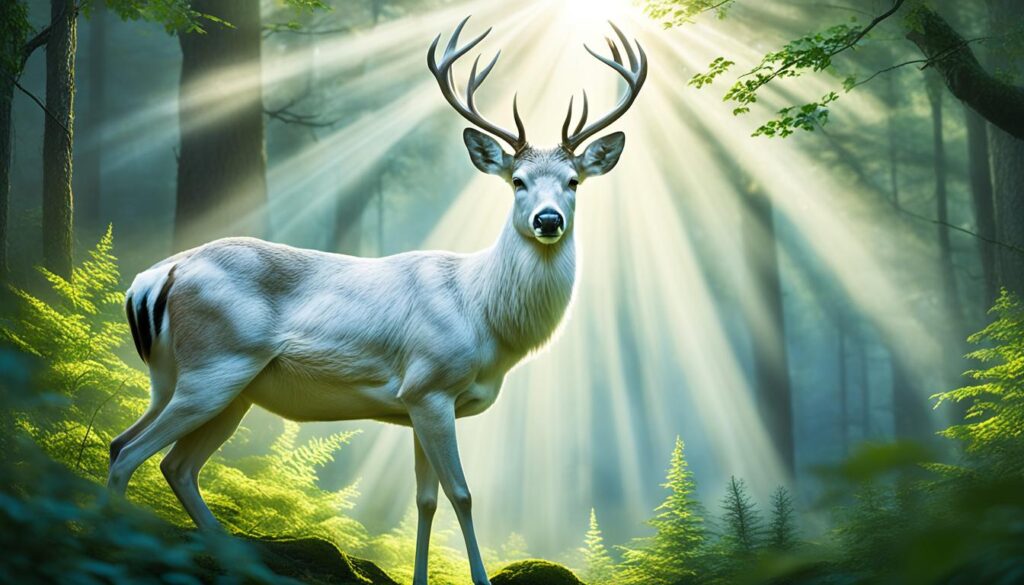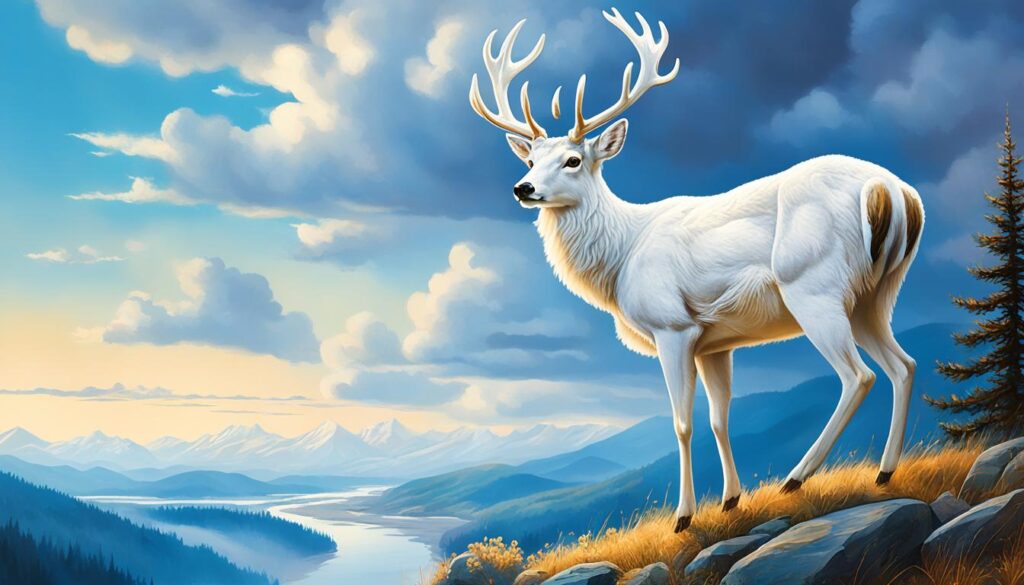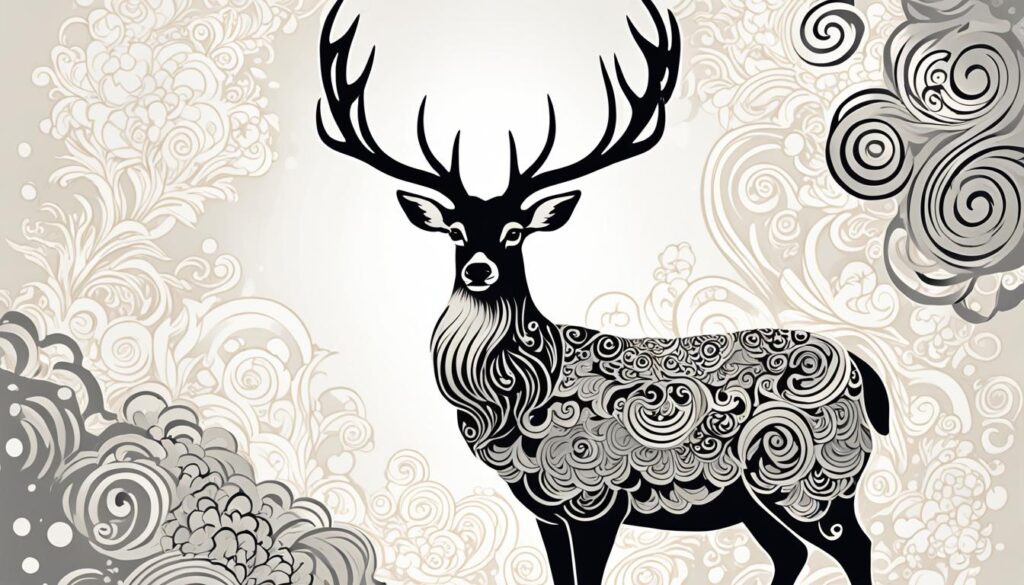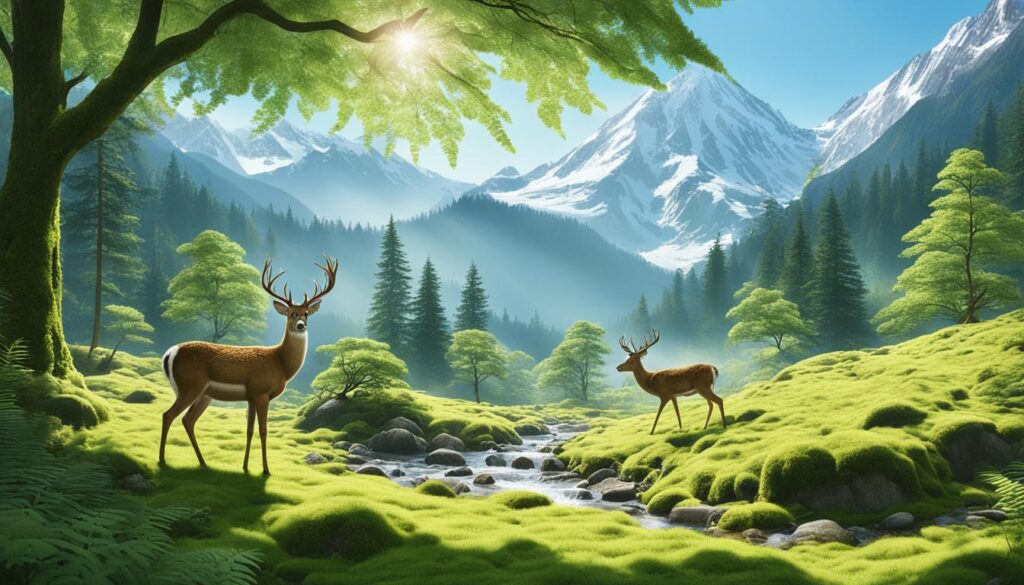The fuzhu deer brand means “white deer” in Japanese. It comes from an old Chinese legend. In this story, the famous Tang Emperor met a very special white deer in his garden. The deer had a bronze medal and the Emperor saw it as a sign of good luck. He thought it showed longer life and wealth. The Japanese have loved this story. They also see the white deer as a sign of luck and long life.
The Legendary Tale of the White Deer
In Chinese myths, the white deer’s story is very special. Legend says during the Tang Dynasty, from 618 to 907 AD, the emperor Hsuan-Tsung met a special white deer in his garden.
The emperor loved art and literature. One day, he was walking through his garden. Suddenly, he saw a white deer. It had a bronze medal showing it was over a thousand years old.
The emperor saw this rare white deer as a sign of good luck. The deer’s visit was seen as a blessing from the heavens. Its appearance brought peace and beauty to the emperor’s place.
This special meeting with the white deer meant a lot to the emperor. He believed the deer showed a deep meaning of life. This tale became very famous, inspiring many chinese poets and thinkers over the years.
Symbolism of the White Deer in Chinese Culture

The white deer is very important in Chinese culture. It stands for a long life and wealth. It’s not just a story; it shows how Chinese people love nature. They want to live in peace with it. This idea of the white deer goes to other places, like Japan. They think it shows a long life too.
“Hakushika” means “white deer” and it’s used as a brand name. This choice isn’t by chance. It shows a long and bright future. This means a lot to Chinese stories. It’s been told for many years. People still love it, in and out of China.
The white deer is still very special in China. This shows how deeply they are linked to nature. And how strong their old stories are. Even as China becomes more modern, the white deer is a key part of its history. It’s a strong symbol of their deep and colorful culture.
The Fuzhu Deer: A Mythical Beast
In Chinese mythology, the Fuzhu (夫诸) is an interesting deer-like creature. It appears in the book “Classic of Mountains and Seas” (山海经). This book talks about it as a white deer with four horns. It is known for being kind and very clean.
The Fuzhu deer lives on Ao’an Mountain, as the old Chinese text tells us. It gets its name from words that mean “gentle and clean.” People connected it with floods and natural disasters. This made the Fuzhu an important symbol in Chinese stories and myths.
The Fuzhu deer is different because it has four horns. This makes it stand out among other mythological creatures. Its special appearance and good nature have made it beloved in Chinese tales.
The Fuzhu Deer as an Omen of Floods

In Chinese myths, the Fuzhu deer is very special. It is a pretty white deer with four antlers. Seeing a Fuzhu deer means a big flood is coming soon. This is a warning of a serious disaster.
The Fuzhu deer warns people about floods and bad events. It looks amazing and has powers that are not natural. Its visit is like a message that nature will soon be very wild.
The Fuzhu deer means more than peace in Chinese stories. It warns about dangers, linking nature and spirits. It shows how small humans are compared to nature’s strength.
The Fuzhu deer’s meaning is not just a story; it is part of China’s culture. Meeting this special deer tells people to get ready for floods. It helps keep a balance between nature and spirit worlds.
Artistic Depictions of the Fuzhu Deer

The Fuzhu deer is a mythical creature from China long ago. It has been shown in many artworks. These show a white deer with four horns. This is based on ancient stories. The art helps keep the Fuzhu deer’s story alive in China.
Different artists draw the Fuzhu deer in different ways. They highlight its special look and meanings. For example, Xiaojing Yan mixes Eastern and Western symbols in their art. They use the Fuzhu deer in a series called “Lingzhi Girl”.
In the artwork “Far From Where You Divined”, the artist shows how the Fuzhu deer can change shape. They use a material called lingzhi to make these changes visible.
Today, we see many ancient stories in new forms. They appear in books, games, and cultural activities. People draw the Fuzhu deer in many ways. Some make it look weird to show its special features. Others make it beautiful. And some draw it in a cute, funny way for kids to like.
This new art makes the old stories interesting for us now. For instance, an artist named Chen Siyu has made many drawings from ancient books. Teachers like Chen’s work a lot. And people also buy a lot of his drawings. This shows how much people like to see the Fuzhu deer in art.
The art of the Fuzhu deer keeps its old stories alive. But it also makes space for new ways of showing the Fuzhu deer. From 3D sculptures to old drawings, people still find the Fuzhu deer fascinating. It is a big part of China’s art scene even today.
Connections to Japanese Mythology
In both Chinese and Japanese stories, the white deer means a lot. It shows long life and is connected to the gods. Chinese tales about the deer are a big part of Japanese culture. They see the white deer as lucky and linked to living a long life.
China and Japan both value the white deer. This shows how their stories and traditions are linked. Even a mythical deer, the fuzhu deer, appears in myths in both places. This makes their stories even more alike.
The idea of Junishi, twelve animals in the zodiac, came from China. Japan adopted this idea later. The white deer is part of these twelve animals. It’s very important in both cultures.
In Japan, the Myoken-gu Shrine is special. It honors the Three Deities of Creation. One is related to the Big Dipper, which is seen in both Chinese and Japanese myths. This shows how their cultures and myths have mixed over time.
The white deer highlights China and Japan’s shared culture. It brings out their deep connections. People studying or enjoying East Asian myths find this very interesting. It shows how these stories have stayed important over many years.
The White Deer in Chinese Literature
The white deer is special in Chinese stories and poems. It shows up in many Chinese classics. People see the white deer as a very important figure in China’s stories and artworks.
A white deer with four antlers, called Fu Zhu, brings a big flood warning. It stands for a long life, wealth, and finding wisdom in Chinese stories and art.
Besides the Fu Zhu deer, other cool creatures like the nine-tailed fox and a white phoenix are in Chinese tales too. These add to China’s rich mythical world.
The white deer means more than a myth in stories. It’s a sign of peace, beauty, and nature’s wonders. Many writers love to use the idea of the white deer. They write about peace, going beyond, and the magic of nature.
The white deer is in many Chinese tales. Its story is not just for old stories. People still love this legend today. It shows up in children’s books from China and all over the world. The white deer is a big part of China’s stories even now.
Cultural Significance of the White Deer
The white deer, including the mythical Fuzhu deer, is a special symbol in Chinese culture. It stands for long life and wealth. When the Tang Emperor Hsuan-Tsung met a white deer with a special medal, it was seen as very lucky.
People in China and Japan believe white deer bring luck and good health.
The white deer is a symbol in China for long life and success. The Fuzhu deer is known to live for centuries. This makes the white deer a lucky and magical animal in Chinese stories and art.
The white deer is also linked to ideas of living a long life, being wise, and finding spiritual truth. This meaning can be seen in Chinese stories and art. The deer is shown as an important and lucky being. It stands for dreams and goals of the Chinese people.
Legends and Folklore Surrounding the Fuzhu Deer
The Fuzhu deer comes from a old Chinese tale. It’s in the book Classic of Mountains and Seas. People have loved this story for hundreds of years. It says the Fuzhu deer lived on Ao’an Mountain. It was white and had four horns, very clean and warned about floods.
Stories of the Fuzhu deer talk about nature’s balance. They say the Fuzhu shows that everything is in deep harmony. If it’s seen, it might mean that nature’s balance is at risk. This shows China’s respect for nature and its belief in these special creatures.
The myth of the Fuzhu deer is like other tales from around the world. All cultures seem drawn to the mystery of the white deer. It shows us that we all look for meaning in life. Themes of purity and spiritual help are common in these stories.
Diving into the Fuzhu deer tales takes us to a magical place. These stories make us think about life and the unseen. They have kept people fascinated for generations. They remind us of the power of a good story to touch our hearts.
The White Deer in Modern Pop Culture
The white deer, like the Fuzhu deer, is very interesting to many in modern Chinese pop culture. It shows up in movies, TV, digital art, and games. People often talk about what it means, too.
The movies often tell stories of Chinese myths. In the 2019 movie “The Wandering Earth,” the main character sees a magic white deer. This reminds people of the special white deer from the old stories. Also, in the 2021 movie “Once Upon a Time in China,” the white deer is an important part of the story.
Now, the white deer is also in the digital world. In MetaZoo: Cryptid Nation, it’s in the game as a special card. This shows people still love stories about the Fuzhu deer. Even in the Adventure Time show, a character looks like the white deer. This shows how well-known and loved the white deer is today.
Habitat and Sightings of the Fuzhu Deer

The Fuzhu is a mystical deer from Chinese mythology. It comes from the ancient Classic of Mountains and Seas. This old text says the Fuzhu deer lived on Ao’an Mountain.
The Fuzhu deer lives in the rugged, mountainous parts of China. The Classic of Mountains and Seas first talked about it. In these old stories, the Fuzhu lives on Ao’an Mountain. But, no one today has seen a real Fuzhu deer.
Many Chinese storytellers and artists love the idea of the Fuzhu deer. But, no one has reported seeing it. Because of this, the Fuzhu deer is even more mysterious. It is a big part of China’s culture and stories.
